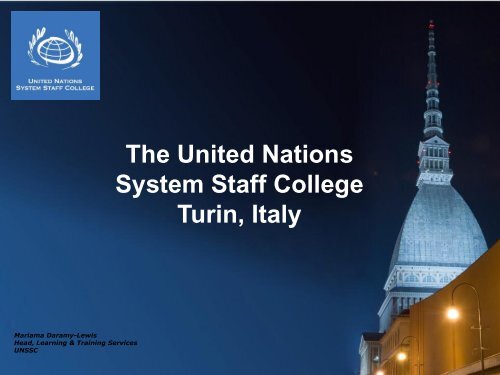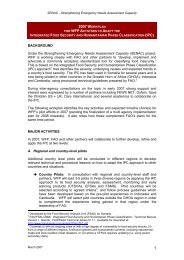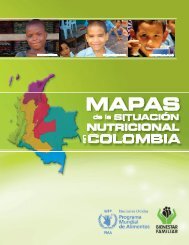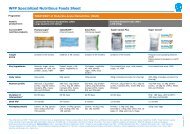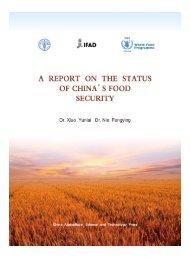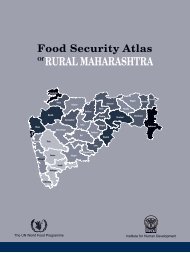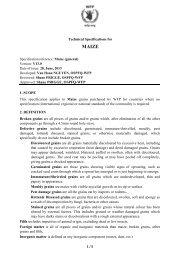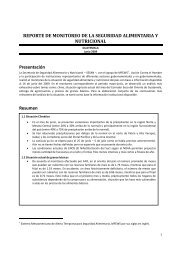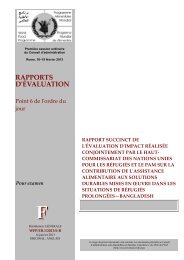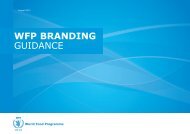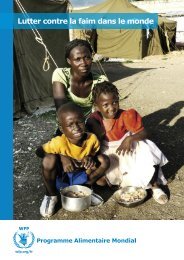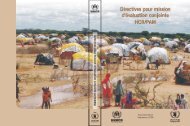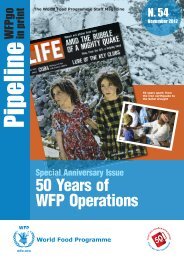The United Nations System Staff College Turin, Italy
The United Nations System Staff College Turin, Italy
The United Nations System Staff College Turin, Italy
Create successful ePaper yourself
Turn your PDF publications into a flip-book with our unique Google optimized e-Paper software.
<strong>The</strong> <strong>United</strong> <strong>Nations</strong><br />
<strong>System</strong> <strong>Staff</strong> <strong>College</strong><br />
<strong>Turin</strong>, <strong>Italy</strong><br />
Mariama Daramy-Lewis<br />
Head, Learning & Training Services<br />
UNSSC
<strong>United</strong> <strong>Nations</strong> Secretary-General,<br />
Ban Ki Moon<br />
"Achieving gender equality and empowering<br />
women is a goal in itself. It is also a<br />
condition for building healthier, better<br />
educated, more peaceful and more<br />
prosperous societies”.<br />
General Assembly debate, March 2007
Background to UNSSC and OSAGI (Office<br />
of the Special Adviser on Gender Issues)<br />
collaboration<br />
• Developing a mandatory E-learning for the UN<br />
<strong>System</strong> building upon knowledge and<br />
methodology advanced by various agencies<br />
• Enhancing capacity of experts and<br />
professionals<br />
• Gaining leadership support through gender<br />
mainstreaming mediums
Resolution 2009 / 12<br />
Mainstreaming a gender perspective into all policies and<br />
programmes in the <strong>United</strong> <strong>Nations</strong> system<br />
<strong>The</strong> Economic and Social Council,<br />
…..<br />
3. Requests the Secretary-General to submit a detailed report to the<br />
Economic and Social Council at its substantive session of 2010 on<br />
progress made by <strong>United</strong> <strong>Nations</strong> entities in mainstreaming a<br />
gender perspective in the design, implementation, monitoring and<br />
evaluation of all policies and programmes and in capacity<br />
development, including through mandatory training for all staff and<br />
personnel and specific training for senior managers, as a critical<br />
means of raising their awareness, knowledge, commitment and<br />
competencies, as well as with regard to collaborative efforts to<br />
ensure effective gender mainstreaming in the <strong>United</strong> <strong>Nations</strong><br />
system.<br />
• 40th plenary meeting<br />
• 28 July 2009
Mainstreaming GM in the UN<br />
• 2008 – OSAGI and UNSSC collaboration<br />
• 2009 - IANWGE recommended the development<br />
of a system-wide strategy on capacitydevelopment<br />
for gender mainstreaming<br />
• 2009 - Pre – Expert Group Meeting, NY<br />
• 2010 - Expert Group Meeting, <strong>Turin</strong>
<strong>The</strong> Expert Group Meeting (EGM) 7-9 June 2010<br />
Organized by the Office of the Special Adviser on Gender<br />
Issues (OSAGI) and the <strong>United</strong> <strong>Nations</strong> <strong>System</strong> <strong>Staff</strong> <strong>College</strong><br />
(UNSSC)<br />
Purpose: To achieve full agreement on the learning objectives<br />
and contents for:<br />
o A mandatory basic e-learning module on gender<br />
mainstreaming in the UN system;<br />
o A second level module for senior staff in the UN system;<br />
o Develop a strategy for mandatory participation in basic<br />
e-learning; and<br />
o Develop an action plan for engaging senior managers in<br />
capacity development of UN staff.
Core Content for Module 1: Mandatory training course for all staff<br />
• Gender terminology and definition of gender concepts<br />
• Brief history of milestones specifically in relation to<br />
gender mainstreaming<br />
• Policies and treaties<br />
• Values and power<br />
• Useful links<br />
Expected outcomes for module 1<br />
• Gain knowledge of gender-based differences<br />
• Be aware of gender issues and gender-based power relations<br />
• Apply knowledge of gender in their work<br />
• Address needs of the vulnerable individuals when making<br />
decisions
Content for Module 2: Senior management<br />
• Leadership<br />
• Advocacy<br />
• Accountability<br />
Expected outcomes for module 2<br />
• Commit to methodology to include gender into work<br />
performance<br />
• Lead by example by demonstrating understanding of<br />
gender mainstreaming<br />
• Define a communication strategy to influence people to<br />
genuinely engage in gender mainstreaming efforts
Content Acquisition<br />
Methods and procedures for creating and<br />
capturing, and validating e-learning content:<br />
• Traditional approach (SME)<br />
• Rapid development approach.<br />
• Occupational analysis<br />
1<br />
Create Pilot Course<br />
Pilot program including identify appropriate<br />
content/courses and user group (Corporate, Internal,<br />
External) to generate lesson learnt and further refine.<br />
2<br />
E-Learning<br />
ROADMAP<br />
3<br />
4<br />
(ID Content & User Group)<br />
Design<br />
Convert content and courses into e-<br />
learning formats. Storyboard technical<br />
planning.<br />
Development<br />
E-learning authoring, Quality control<br />
and standards. Prototype.<br />
Communicate<br />
& Market<br />
7<br />
6<br />
Evaluate,<br />
Assess &<br />
Improve<br />
5<br />
Launch in LMS<br />
Pilot e-learning course in LMS.<br />
Facilitate with collaborative<br />
learning features . Create roll<br />
out plan with internal training<br />
professionals.
Funding for Module 1 and Module 2<br />
Possibilities:<br />
• High Level Committee on Management<br />
(HLCM) trust fund designed to support<br />
projects of a system-wide nature and<br />
which would improve coherence in the<br />
UN system<br />
• Goals of Module 1 and Module 2 are<br />
congruent with Terms of Reference of the<br />
trust fund
<strong>System</strong>-wide Capacity Building<br />
Work of WFP<br />
<strong>The</strong> work undertaken by the <strong>College</strong> is<br />
directly aligned with WFP’s programme for<br />
capacity development to mainstream<br />
gender in their work, including carrying out<br />
gender analysis.
Thank you!


